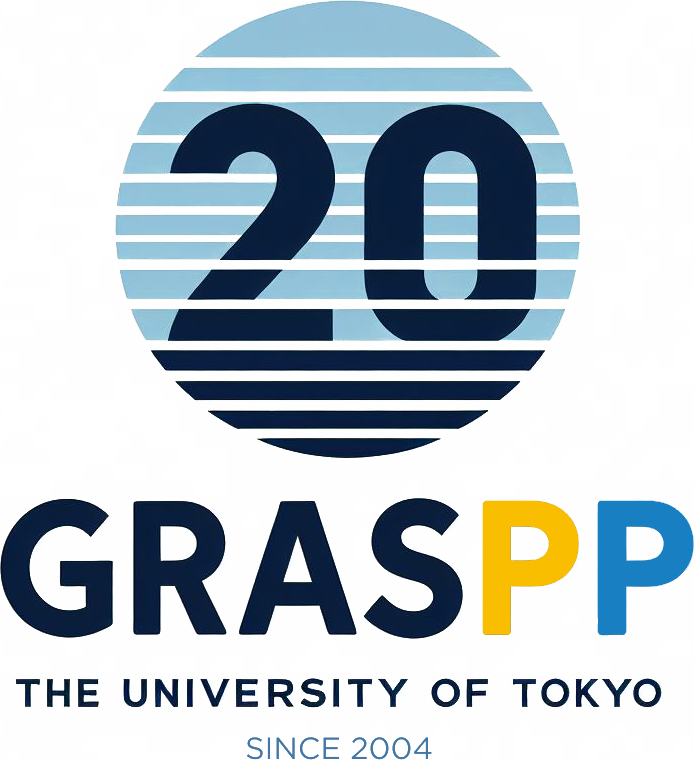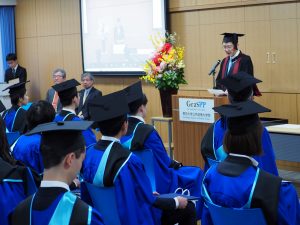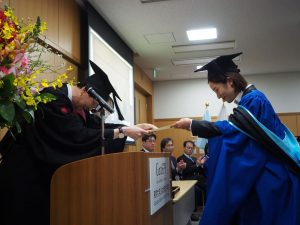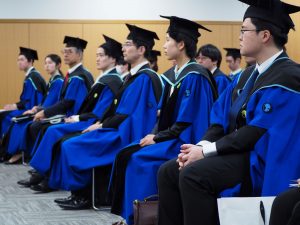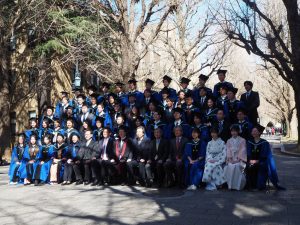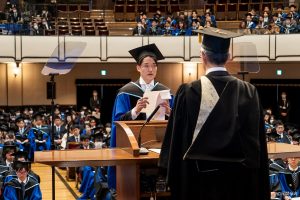The GraSPP Spring diploma presentation ceremony AY2023 took place on Thursday, March 21, at SMBC Academia Hall in the International Academic Research Building.
The diploma was presented by the Dean of the Graduate School of Public Policy, who congratulated them on completing the program together with the GraSPP staff. 67 students have been conferred the diploma this Spring.
The commendation ceremony for high-achieving graduates was also held. The Best Performance Award was presented to one student in the Master’s program.
Hiroaki Nawa, the winner of the Best Performance Award, gave a speech at the AY 2023 Diploma Presentation Ceremony held by the University of Tokyo as a representative of those who have completed the program.
Valedictorian Speech by Hiroaki Nawa
- Photo: OZEKI Yuji
- Photo: OZEKI Yuji
Message from Dean Iida
To our graduating students, we extend our congratulations on your graduation today.
We would also like to congratulate all of your family members, friends and those who have supported them so far.
We have a total of 67 graduates this month, including 2 in legal policy, 9 in public management, 22 in international public policy, 22 in economic policy, and 12 in the international program (including 6 double-degree students).
Now, the distinctive feature of the Graduate School of Public Policy (GraSPP) is its interdisciplinary nature. In other words, no matter what course you take, you are required to take law, politics, and economics courses. However, this is easier said than done, because different fields of study can have completely different things to say on any given subject matter.
However, there are a few areas where the message is consistent in law, politics, and economics. Take trade, for example.
In law, we usually teach international economic law, i.e., GATT and WTO law. Its content is complex, but basically, the system is designed to achieve free trade in the long run. In politics, rent-seeking is said to occur. Free trade is always better, but sometimes protectionist forces emerge, and rent-seeking and protectionist policies are adopted. Again, the basic idea is that free trade is the best. Finally, in economics, the message is the clearest: free trade allows for efficient allocation of resources based on the principle of comparative advantage. Under certain conditions, free trade is the first best.
However, the world is rapidly veering in the opposite direction. Most worrisome is the WTO, which is in a serious state of disintegration. Just recently (February 26-March 2), the 13th Ministerial Conference was held in Dubai, but it ended with little success.
Also, as you may know, the Appellate Body of the WTO has ceased to operate. Without it, the decisions of panels cannot be legally adopted. Previously, the WTO law had been building up a body of case law, and a fairly solid body of law was being established, but this has now come to a halt, or at least slowed down significantly.
In addition, there is a security exception in Article 21 of the GATT. This is being used more and more often. Moreover, the U.S. claims that if a party says, “This is a security matter,” then it is automatically applied. If this logic is allowed to prevail, any country that commits a violation of GATT or WTO rules will be exonerated by saying, “This is a security matter.” Can you see how dangerous this is?
Theoretical support for the practice of free trade has been provided by economics, but there is a disturbing trend in economics as well: an MIT economist, Professor Autor, wrote a paper entitled “The China Shock” in which he demonstrated that imports from China have caused the loss of millions of American manufacturing jobs. This was cited not only by economists but also by American politicians. So, it became an excellent weapon for those who wanted to argue for decoupling from China. In this way, economics, which had been focused on free trade, has been shaken.
The reason I say this is to show that what was previously considered true can change rapidly at times. In these rapidly changing times, I hope that you will not stop your studies upon completion of graduate school, but rather, will continue to study harder and harder. Best of luck with your further studies.
In addition, GraSPP aims to train people to become global leaders. Therefore, we hope that you will consider how to keep the torch of free trade burning in these difficult times.
Congratulations again on graduating from graduate school.
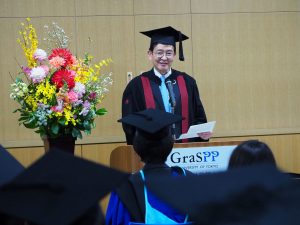
Keisuke Iida
Dean, Graduate School of Public Policy, The University of Tokyo
